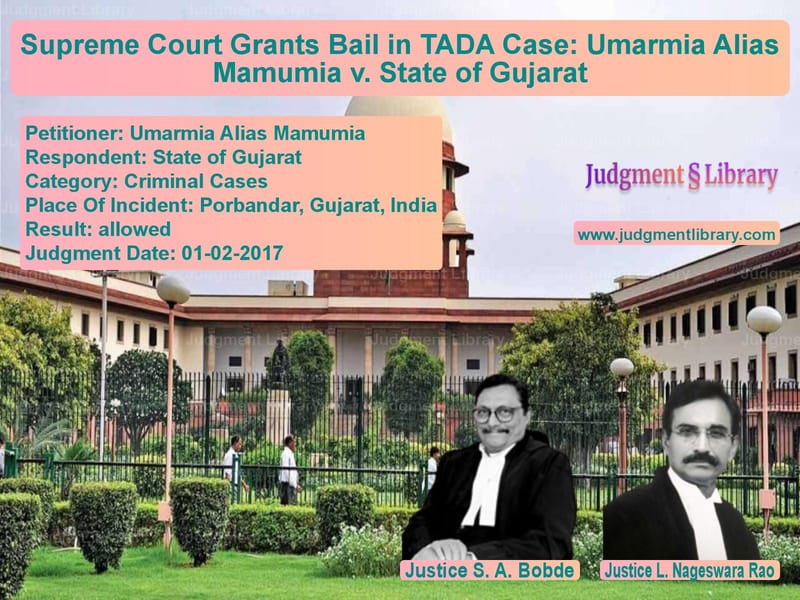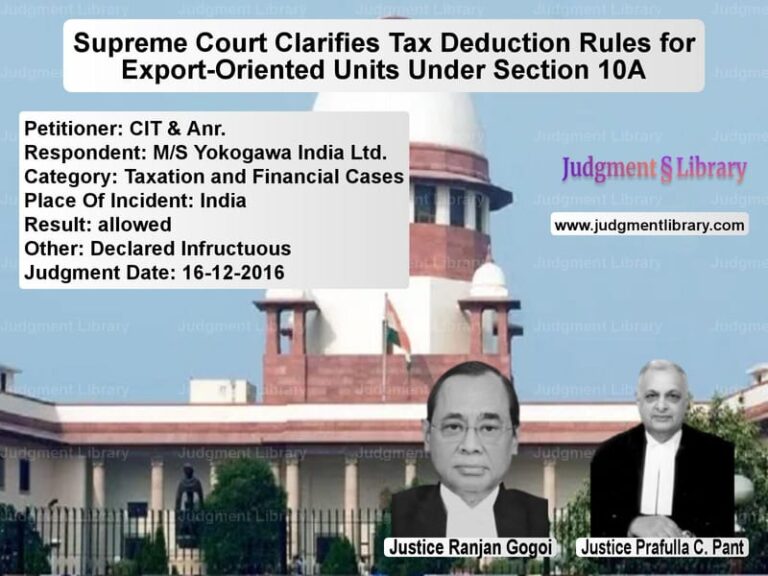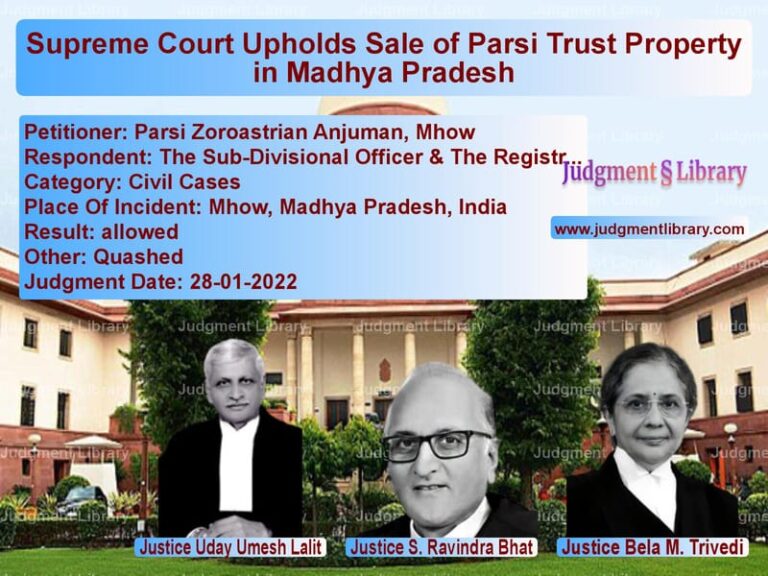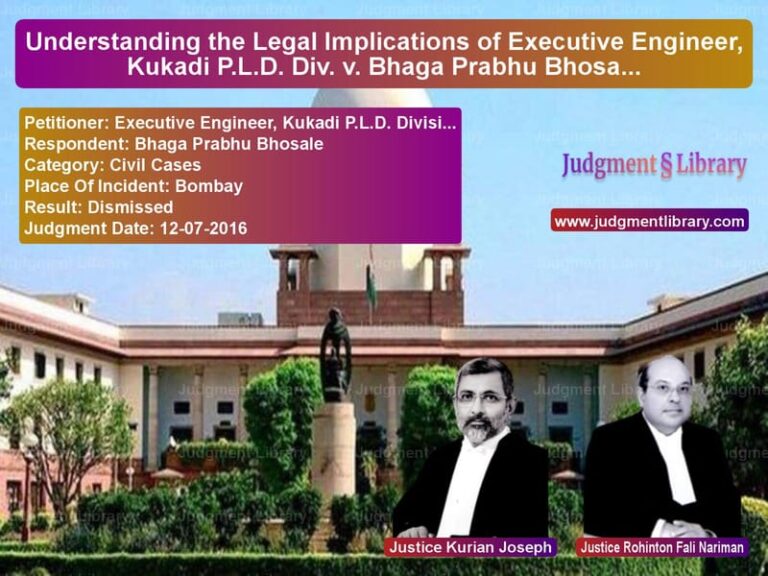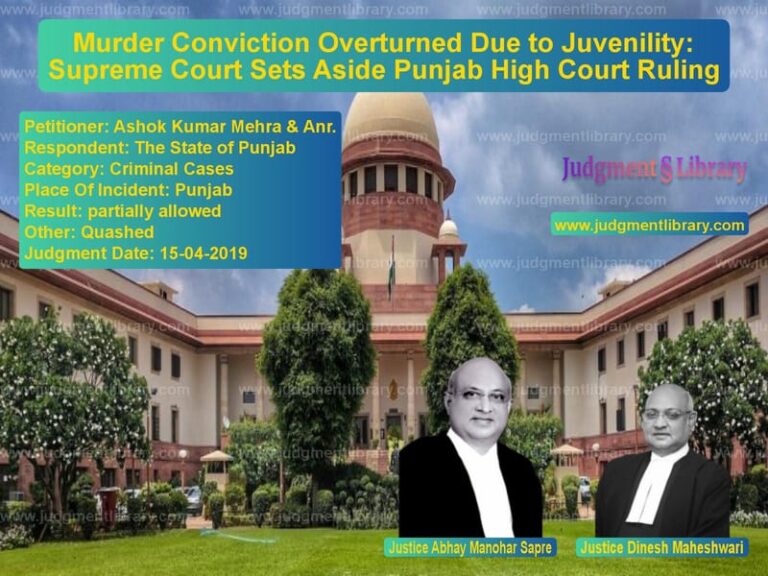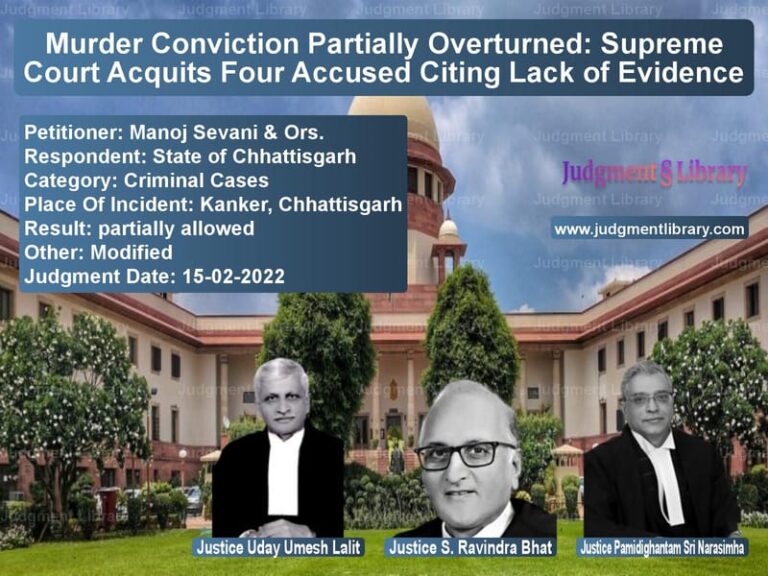Supreme Court Grants Bail in TADA Case: Umarmia Alias Mamumia v. State of Gujarat
Introduction
The case of Umarmia Alias Mamumia v. State of Gujarat concerns a long-pending legal battle under the stringent Terrorist and Disruptive Activities (Prevention) Act, 1987 (TADA). The appellant, Umarmia, sought bail after being in custody for over 12 years. The Supreme Court had to decide whether procedural lapses and prolonged incarceration justified granting bail.
Background of the Case
The case dates back to 1993, when an FIR (No.I-151 of 1993) was registered at Jamnagar City “B” Division Police Station under Sections 3, 4, and 5 of TADA, along with other provisions of the IPC, Arms Act, Explosives Act, and Explosive Substances Act. The prosecution alleged that:
- After the demolition of Babri Masjid in 1992, a conspiracy was hatched in Dubai to smuggle arms and explosives into India.
- Large quantities of RDX, firearms, and explosives were smuggled through Gosa Bara near Porbandar.
- The appellant played a key role in landing, handling, and distributing these weapons.
- He absconded for 10 years before being arrested on January 12, 2005.
Trial Court’s Decision
The Designated TADA Court at Jamnagar denied bail, citing:
- Serious charges under TADA, IPC, Arms Act, and Explosives Act.
- His prolonged absconding raised concerns about flight risk.
- There was a possibility of tampering with evidence if released.
Arguments by the Appellant
- The prosecution failed to take prior approval under Section 20A(1) of TADA before registering the FIR.
- He had already spent 12 years in jail without trial, violating his right to a speedy trial under Article 21 of the Constitution.
- Only 25 out of 192 prosecution witnesses had been examined, and the trial showed no sign of concluding soon.
- Co-accused Usman Gani Noor Mohamad Merchant was granted bail in 1996 on similar grounds.
Arguments by the State
- The appellant was a key conspirator in a case that had implications for national security.
- Even if prior approval was not taken under Section 20A(1) of TADA, other evidence supported prosecution.
- Granting bail could allow the accused to abscond again or influence witnesses.
Supreme Court’s Judgment
The Supreme Court ruled in favor of the appellant, granting bail. The key reasons were:
- Violation of Section 20A(1) of TADA: No prior approval was obtained before registering the FIR, which rendered the case procedurally flawed.
- Prolonged Detention: The appellant had been in custody for 12 years without trial.
- Right to Speedy Trial: The delay in framing charges violated Article 21 of the Constitution.
- Judicial Precedent: The Court had granted bail in similar cases where procedural violations under TADA were found.
- Trial Uncertainty: Only 25 out of 192 witnesses had been examined in over a decade, indicating further delays.
The Supreme Court imposed the following conditions for bail:
- The appellant must furnish a bail bond of Rs.1 lakh.
- He must reside in Porbandar and report daily to the local police station.
- He must surrender his passport and remain in India.
- He must not tamper with evidence or influence witnesses.
Legal Principles Reaffirmed
- Prolonged incarceration without trial violates fundamental rights.
- Section 20A(1) of TADA is mandatory, and its violation vitiates prosecution.
- Bail conditions can mitigate risk without indefinite detention.
Key Takeaways
- Speedy Trial is a Fundamental Right: Courts must prevent unnecessary delays.
- Procedural Compliance Matters: Failure to obtain required approvals can nullify prosecution.
- Proportionality in Bail Decisions: Strict bail conditions can safeguard justice.
Impact of the Judgment
The ruling will influence:
- Future TADA cases: Ensuring cases are prosecuted efficiently and fairly.
- Judicial oversight: Encouraging courts to monitor trial delays.
- Rights protection: Reinforcing constitutional guarantees in national security cases.
Conclusion
The Supreme Court’s decision in Umarmia Alias Mamumia v. State of Gujarat underscores the need for procedural fairness and timely trials. The ruling ensures that anti-terror laws are applied with due process while upholding constitutional safeguards.
Don’t miss out on the full details! Download the complete judgment in PDF format below and gain valuable insights instantly!
Download Judgment: Umarmia Alias Mamumi vs State of Gujarat Supreme Court of India Judgment Dated 01-02-2017.pdf
Direct Downlaod Judgment: Direct downlaod this Judgment
See all petitions in Bail and Anticipatory Bail
See all petitions in Custodial Deaths and Police Misconduct
See all petitions in Judgment by S. A. Bobde
See all petitions in Judgment by L. Nageswara Rao
See all petitions in allowed
See all petitions in supreme court of India judgments February 2017
See all petitions in 2017 judgments
See all posts in Criminal Cases Category
See all allowed petitions in Criminal Cases Category
See all Dismissed petitions in Criminal Cases Category
See all partially allowed petitions in Criminal Cases Category

